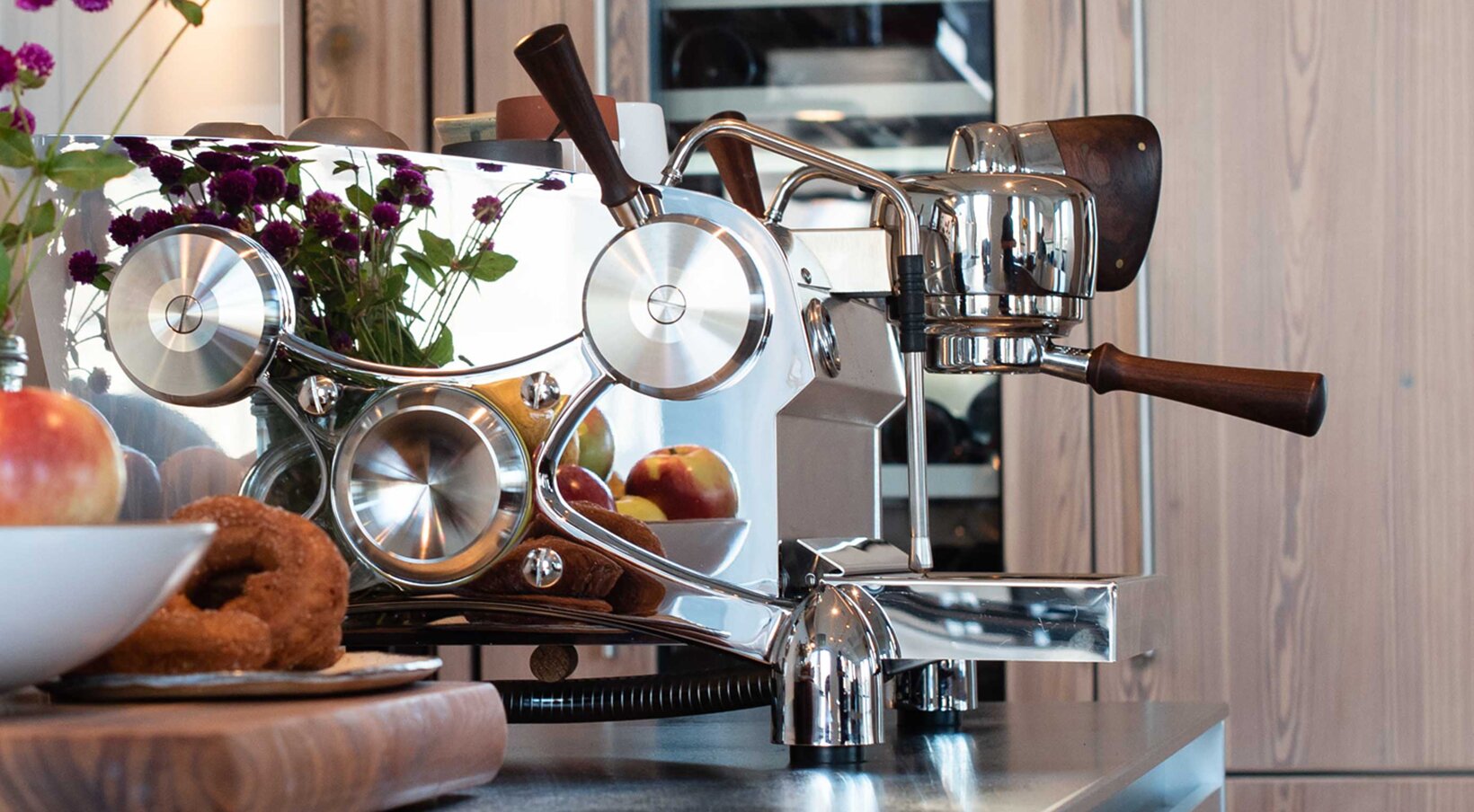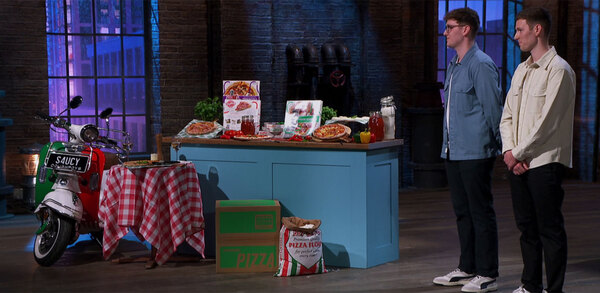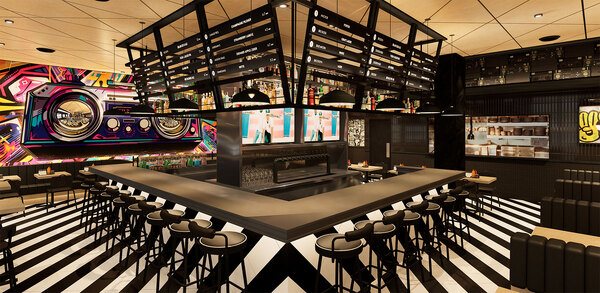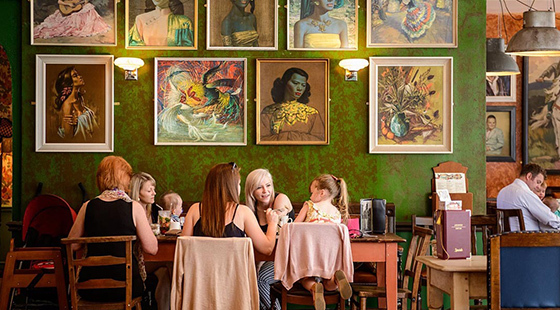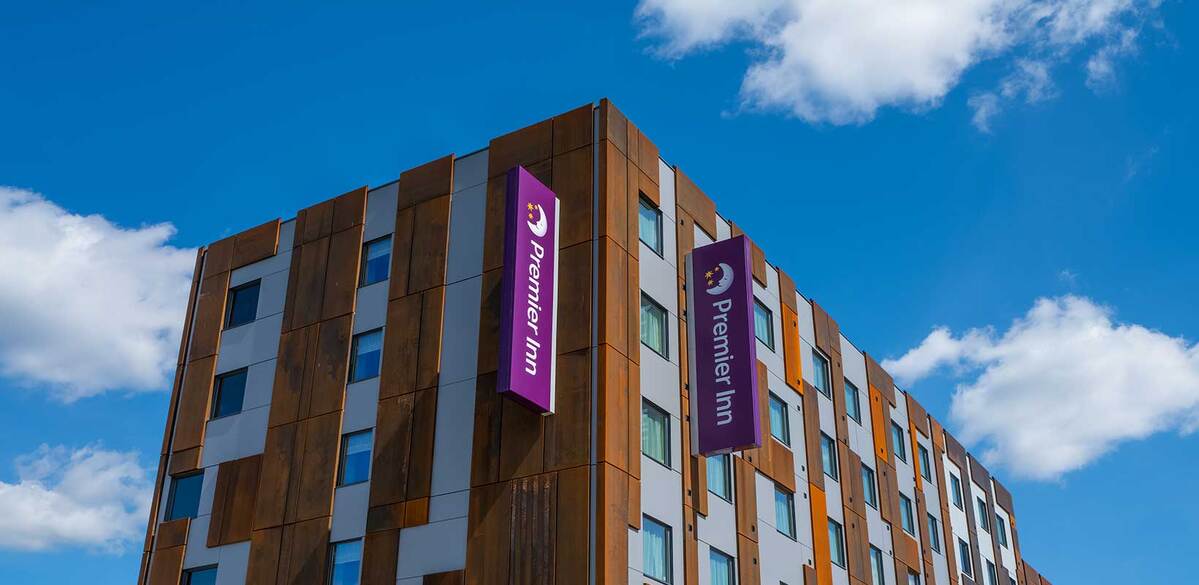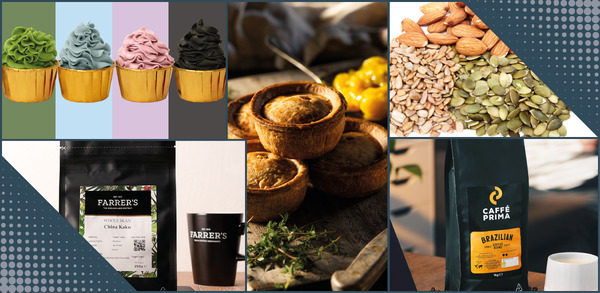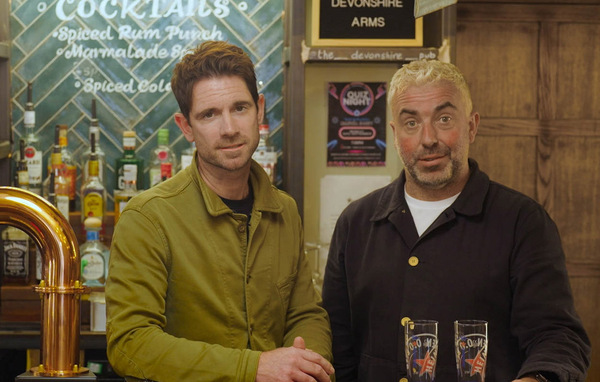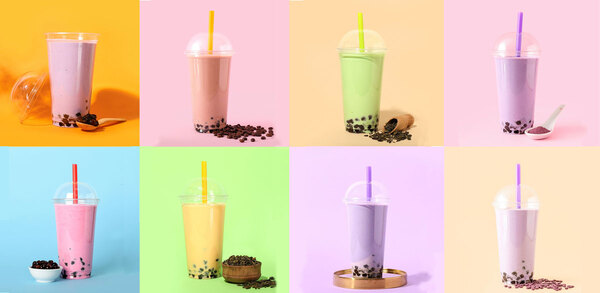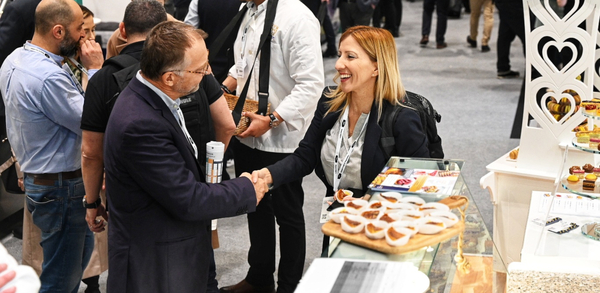The new brew: how technology is creating the next generation of coffee machines
Whether you go super-automatic or choose a hybrid machine, there has been plenty of innovation in the beverage equipment market. Ian Boughton discovers the latest technology.
It is clear that the pandemic did not stop coffee machine makers from coming up with new ideas, and neither did clients cut back on their interest. Research from Brita, the water-treatment company, suggests that of the 88% of businesses that used lockdown time to reconsider their business strategy, an impressive 38% updated their equipment.
From the coffee machine sector, there has been surprising recent unanimity over the theory that “technology is now the key” in brewing equipment. There remains disagreement over the place of fully automatic machines in quality coffee, with one brand claiming “the future is super-automatic”’.
Not entirely, says brand manager Rob Ward of Cimbali, which has recently taken a controlling share in Slayer, an American espresso machine brand.
“The big difference in the super-automatics was a divide between the ‘wet and warm’ school of thought, and those whose focus is higher in terms of quality espresso. The Slayer brand (pictured top), which is now getting its first support in the UK, is at exactly the opposite end from super-autos: we are looking at the ultimate quality in the cup, because café coffee now has to be significantly better than home coffee.
“Where technology is increasing in machines is in connectivity, with bidirectional WiFi. It is already common for information to be taken from machines, but now information and instruction can also be pushed back to the machine, allowing adjustment, tweaks and menu updates to be done remotely by the service provider or group head offices.”
Technology has become a key factor, agrees Fracino, the British espresso machine maker. However, the value of technology is in ensuring that a machine is reliable and fit for an operator’s purpose – and Fracino argues that super-autos can fall down on reliability.
“The expectations of bar management for consistently high-quality coffee is still hampered by their own lack of resource for barista training,” says Fracino’s head of global sales and marketing Peter Atmore. “Increasingly, their solution is to install fully automatic coffee machines, where staff press a button and move on to other duties. However, these machines often require a massive initial investment, can be unreliable and complex to set up and require onerous daily cleaning.
“So we have created Velocino, a state-of-the-art hybrid machine, which combines the convenience of a high-quality, bean-to-cup coffee machine with the simplicity of a traditional espresso machine. It is the same price as a traditional machine, but avoids complex technology and the expense of leasing and maintenance.
“The term ‘hybrid’ means a combination of a standard espresso brew-group with a fully automatic milk foamer system. Venues with a high ratio of multishift staff do benefit from integrated milk foaming systems, which now provide high-quality texturised milk and can be programmed to create a wet latte foam or a drier cappuccino one. “But we remove the complex engineering, moving parts and expensive electronic control modules of a ‘bean-to-cup’ system, which increases reliability and substantially reduces maintenance costs.”
In the Velocino, he adds, both the brew group and the milk foamer system are side-by-side above the cup on the drip tray – this is the same placing as a fully auto machine, and means milk and coffee are dispensed into the cup in one process at the same time, instead of the barista having to combine them.
“The two-group version of the Velocino allows a busier venue to have this same simple system, with twice the output capacity – and that is not a feature available from the majority of bean-to-cup systems on the market,” he says.
By contrast, Eversys continues to champion the case of fully automatic machines, and commercial director Kamal Bengougam is on record as saying that “the future is super-automatic”.
At the recent launch of its Shotmaster, Eversys predicted that the balance of power between traditional machines and super-automatics will shift in the next few years: far more super-automatic machines will be sold, because they are “a better fit for our age than the traditional scenario of a barista behind a machine taking two minutes to make each coffee.”
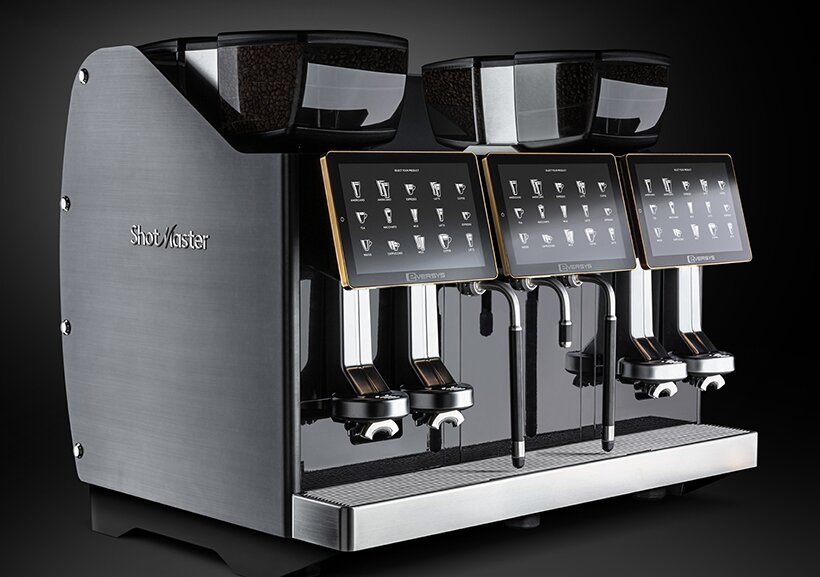
Eversys launched the Shotmaster as “the ultimate barista tool, which can brew up to eight shots at a time.” In the biggest Shotmaster, the operator can choose from four different types of milk held in a module, and from four bean hoppers and grinders, allowing a wide variety of drink configurations. The machine can be operated by two baristas at the same time.
Coffee pods for hospitality
As a trouble-free, self-serve system, the coffee capsule is now well-established. The Kruger K-Fee system has now arrived in the UK, offered as a low-cost machine for those who need a quality coffee facility, but not in great numbers, such as in small bars and hotel bedrooms. This system uses only its own capsule format, but within that are a couple of unique products.
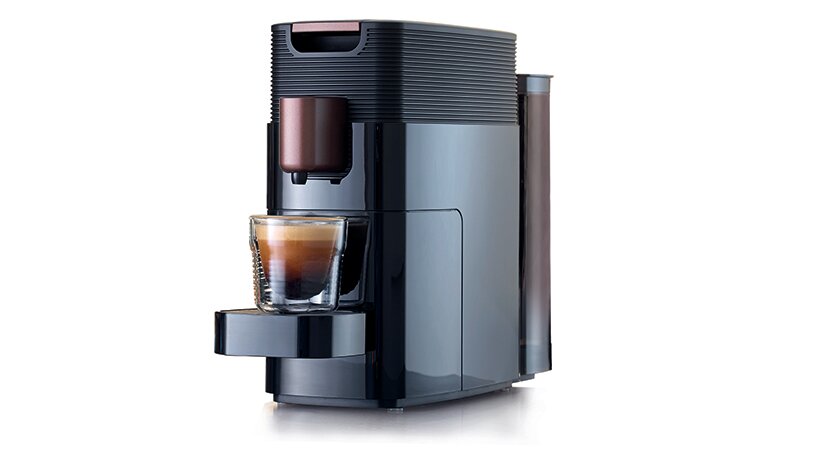
While some of its machines create black coffee only, Kruger has a capsule which holds instant coffee and a milk powder – in effect, this produces a white coffee from a machine that has no milk facility. Another curiosity is the capsule with a filter and a removable tab – this increases the flow rate of brew water, producing a filter-style ‘long’ black coffee with no crema instead of the usual espresso-style brew produced by a capsule.
Another new ‘trouble-free’ proposition involves the reappearance of a known technology from Illy. This is the ESE, the ‘easy-serving espresso’ pod, which the brand invented in the 1970s, and which now arrives in a machine intended for self-serve in hotel lounges and guest rooms.
The ESE is the ‘original’ coffee pod. It is not a capsule but resembles a tea-bag, circular in shape, holding an extremely firm ‘puck’ of coffee. It was originally devised to go into a standard espresso brew basket, saving the barista time in grinding and measuring a dose of coffee. It did become popular but was not very widely promoted.
“While capsules have been the star of the show for the last few years, there is a growing focus on sustainability,” remarks Stuart
Holmes, managing director of Illy UK. “Clearly, capsules are more difficult to recycle, so the compostable ESE pod has all the potential to become popular again due to its inherent sustainability.”
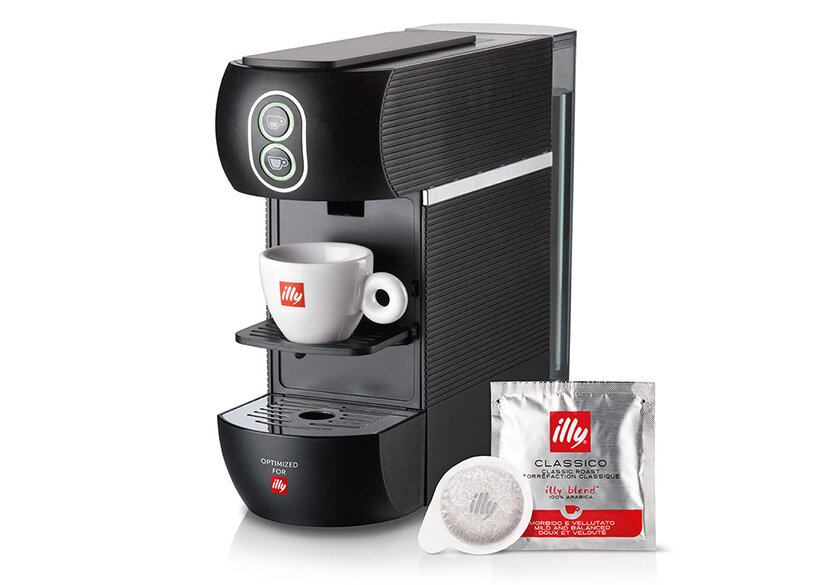
The new machine has an automatic mechanism to insert and expel the pods – housekeeping staff just empty the machine drawer.
The new normal for coffee machines
The Marco brand of Dublin has been notable for some of the biggest technological advances in what used to be inadequately known as ‘water-boilers’, and has recently been looking at operational detail.
“One key demand from our customers is for hygienic solutions,” says marketing head Gemma Kiernan. “We are seeing that, as operators reopen, they need to show that they are taking steps to reduce communal touchpoints. The demand for hands-free systems has influenced our innovation this year and has led to releases like our Hands-Free FRIIA, as well as simple tap adapters for urns and water boilers.”
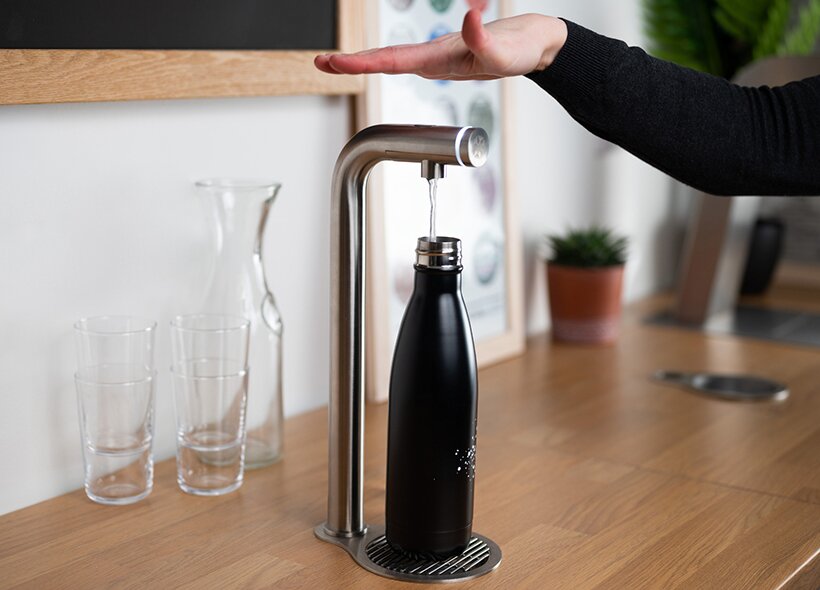
The hands-free cold-water dispenser is operated by passing a hand above a sensor at the top of the unit. The hands-free tap allows the user to start the water flow by touching with the back of a cup.
The trend that Welbilt has seen is for customisable espresso machines, in the sense of decor. “We have seen a move by all operators to take a share of the out-of-home coffee market,” says Augusto Meléndrez, director of product management at Crem, the brand owner. “Those who maybe had not served espresso prior to lockdown have increased their takeaway business by offering it – a quarter of Brits buy hot drinks from fast food chains, while one in five buy from a supermarket or store café.”
This, he notes, puts pressure on hospitality outlets, and is the reason why some operators have worked hard on making their sites more attractive.
“With more and more operators investing in their coffee offering, the right coffee machine becomes integral. Crem believes in allowing an operator to create their perfect machine for the type of coffee they want to serve and for the aesthetics of the venue,” he says.
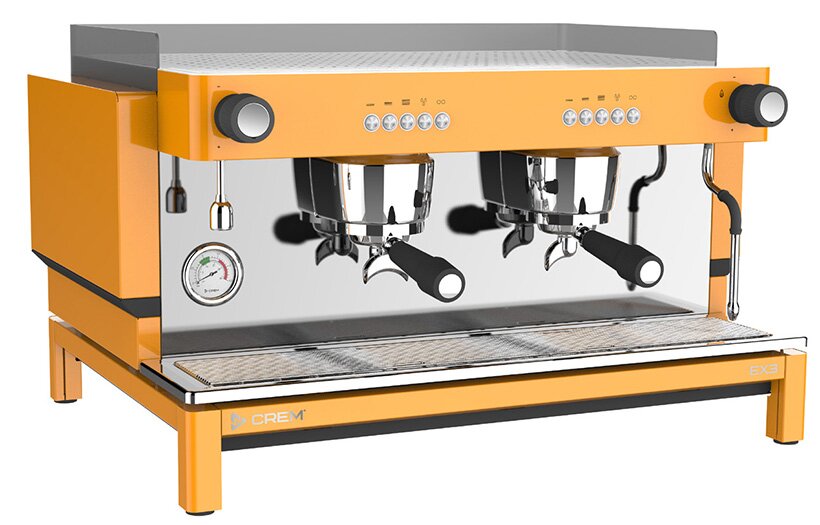
“In response to demand for the espresso machine that can be customised to fit an establishment perfectly, Crem designed the EX3 as a unique espresso machine that can blend into the overall design or stand out and be the focal point of the room.”
Suppliers
Cimbali/Slayer www.slayerespresso.com
Fracino www.fracino.com
Eversys www.eversys.com
Kruger/K-Fee www.krueger-group.com
Marco www.marcobeveragesystems.com
Welbilt www.welbilt.uk



